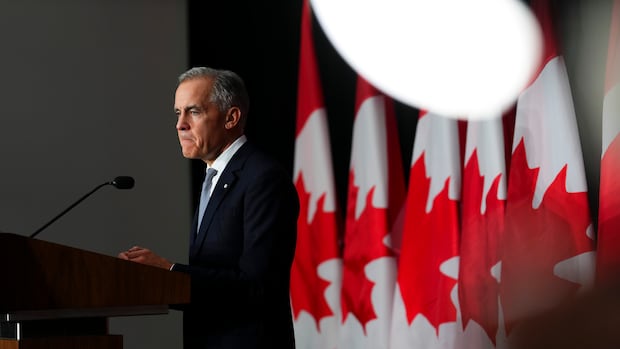ManitobaThe union that represents thousands of federal public workers fears Canadians will feel the impact both on the jobs and service quality side if Ottawa makes good on signalled cuts to the civil service in Tuesday’s budget.Unions worry signaled reductions from Carney government could impact 9,000-strong Manitoba workforceBryce Hoye · CBC News · Posted: Nov 04, 2025 6:00 AM EST | Last Updated: 2 hours agoListen to this articleEstimated 5 minutesPrime Minister Mark Carney makes a live address on Canada’s plan to build a stronger economy in advance of the 2025 Budget, at the University of Ottawa in Ottawa on Oct. 22. (Sean Kilpatrick/The Canadian Press)A union that represents thousands of federal public workers fears Canadians will feel the impact both on the jobs and service quality side if Ottawa makes good on signalled cuts to the civil service in Tuesday’s budget.The Carney government has signaled intentions to make reductions to the federal workforce, instructing all departments to engage in cost-cutting exercises of 7.5 per cent this year rising to 15 per cent the next.”Our members are the ones that are standing up at the counter at the passport office, that are standing at the counter processing your unemployment and your maternity benefits, and answering the phone at the Canada Revenue Agency,” Marianne Hladun, regional executive vice-president for the Prairies for the Public Service Alliance of Canada.”I think sometimes people think of public service workers as a bunch of bureaucrats with no face, but when you need them, you expect them to be there, and that is our biggest concern.”There are 13,235 workers employed in Manitoba by the federal government as of this year, not including RCMP, Canadian Armed Forces or Canadian Security Intelligence Service members, according to Statistics Canada. PSAC represents about 9,000 of those workers, from Veterans Affairs case managers, passport office and Parks Canada staff, Service Canada and Indigenous Services workers, Canada Pension Plan and Canada Revenue Agency call centres, Canadian Food Inspection Agency inspectors and more.Last week, federal Finance Minister Francois-Philippe Champagne said the size of the civil service is “not sustainable.” Manitoba’s share of the federal workforce grew by just under 1,900, or about 16 per cent, between 2019 and 2025.Champagne pointed to growth in the civil service during the pandemic and suggested the government would be “very compassionate” in terms of how it goes about reducing it.Hladun called those comments “absolutely reckless for Canadians.”Prime Minister Mark Carney jokes with Minister of Finance and National Revenue Francois-Philippe Champagne as they greet families before participating in an announcement at a community centre in Ottawa on Oct. 10. (Justin Tang/The Canadian Press)She said many departments are already understaffed, and pointed to a recent Auditor General report that found long wait times are common at CRA call centres.”We saw what happened at Canada Revenue Agency when they cut all the term positions,” said Hladun.”The reality is some departments are so underfunded that I don’t know how they’ll have capacity to even meet any service standards, even if they’re not meeting them today.”Adam King, assistant professor of labour studies at the University of Manitoba, said what the Carney government has signalled thus far does not hint at public austerity measures in the traditional sense of cuts across the board.”It is about reorientation … toward a kind of capital-focused nation-building, to some extent, project and away from some of the emphasis on social programming and in the administrative portion of the state that grew during the Trudeau years,” King said Monday.”I think what PSAC and many other federal public unions are probably concerned about is, is that this does kind of portend a reorientation away from some of the things that they would argue I think make Canada resilient socially and economically.”King noted talk of cuts is happening as federal unions are in bargaining with the federal government.”The big question here is going to be workforce adjustment, and workforce adjustment is not just nice words but is actually part of the collective agreement,” said King. Adam King, assistant professor of labour studies at the University of Manitoba, says workforce adjustment is one of the big questions hanging over the federal budget’s release. (Submitted by Adam King)PSAC and Professional Institute of the Public Service of Canada are the two largest federal civil service unions. Both have details in their collective agreements that include workforce reduction provisions that are “some of the best workforce job security protections in any collective agreement in the country, if not the world,” said King.The Treasury Board wants those provisions gone, King says, but the fact that they’re in existing agreements gives PSAC and PIPSC “significant leverage.””This is going to be a major issue in this round of bargaining and it’s going to be amplified by their plans to make these various service cuts and workforce reductions,” said King. “We may be heading into a period here of significant labour relation tensions because of this.”Carney has promised a variety of megaprojects are on the horizon. Though the Port of Churchill expansion didn’t make the first round, the federal government expressed interest and suggested some details still need to be ironed out.Carney has said to expect the second tranche of project announcements to come before the Grey Cup takes place in Winnipeg Nov. 16Hladun said a number of Manitoba-based federal sector workers would be needed to facilitate any coming Port of Churchill expansion.Marianne Hladun, executive vice-president for PSAC’s prairie region, seen here at a PSAC rally in 2018. Hladun says PSAC members ‘are the ones that are standing up at the counter at the passport office, that are standing at the counter processing your unemployment and your maternity benefits, and answering the phone at the Canada Revenue Agency.’ (CBC)”All of the environmental factors that would go into expanding the Port of Churchill would need people from Environment Canada, would need Transport Canada, people with the rail line and the airline in the marine safety, making sure that the waterways are safe and that the wildlife and our treasured belugas are kept safe,” said Hladun.”If they’re not there, that could delay the project or it could mean that that works not done. And then it puts the community in jeopardy, it puts the environment in jeopardy and that’s the impact that we could feel directly in Manitoba.”CBC News requested a statement from the Treasury Board of Canada but didn’t hear back before publication.ABOUT THE AUTHORBryce Hoye is a multi-platform journalist with a background in wildlife biology. He has worked for CBC Manitoba for over a decade with stints producing at CBC’s Quirks & Quarks and Front Burner. He was a 2024-25 Knight Science Journalism Fellow at MIT. He is also Prairie rep for outCBC. He has won a national Radio Television Digital News Association award for a 2017 feature on the history of the fur trade, and a 2023 Prairie region award for an audio documentary about a Chinese-Canadian father passing down his love for hockey to the next generation of Asian Canadians.Selected storiesEmail: bryce.hoye@cbc.caFacebookMore by Bryce Hoye
Thursday, 5 Feb 2026
Canada – The Illusion
Search
Have an existing account?
Sign In
© 2022 Foxiz News Network. Ruby Design Company. All Rights Reserved.
You May also Like
- More News:
- history
- Standing Bear Network
- John Gonzalez
- ᐊᔭᐦᑊ ayahp — It happened
- Creation
- Beneath the Water
- Olympic gold medal
- Jim Thorpe
- type O blood
- the bringer of life
- Raven
- Wás’agi
- NoiseCat
- 'Sugarcane'
- The rivers still sing
- ᑲᓂᐸᐏᐟ ᒪᐢᑿ
- ᐅᑳᐤ okâw — We remember
- ᐊᓂᓈᐯᐃᐧᐣ aninâpêwin — Truth
- This is what it means to be human.
- Nokoma











